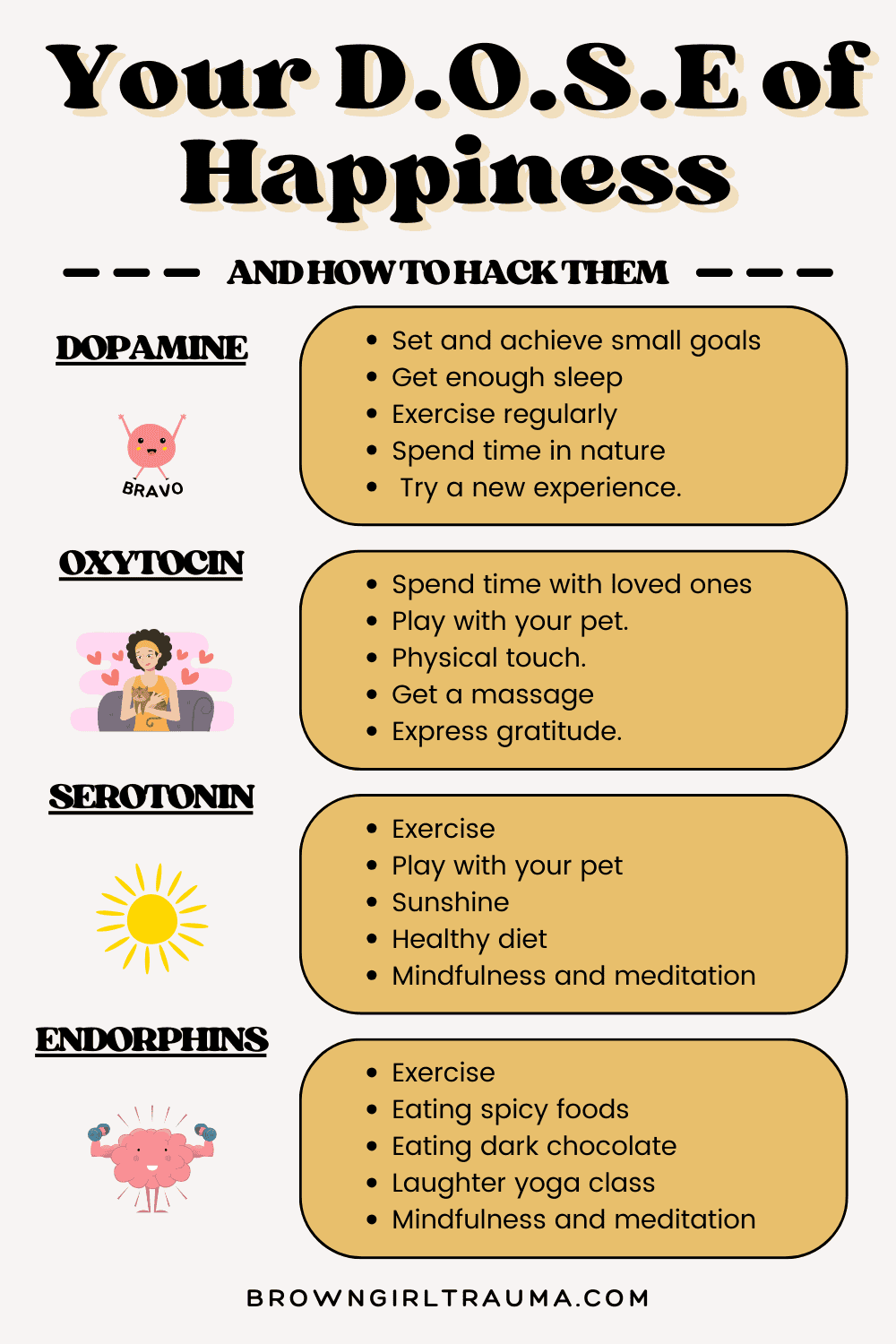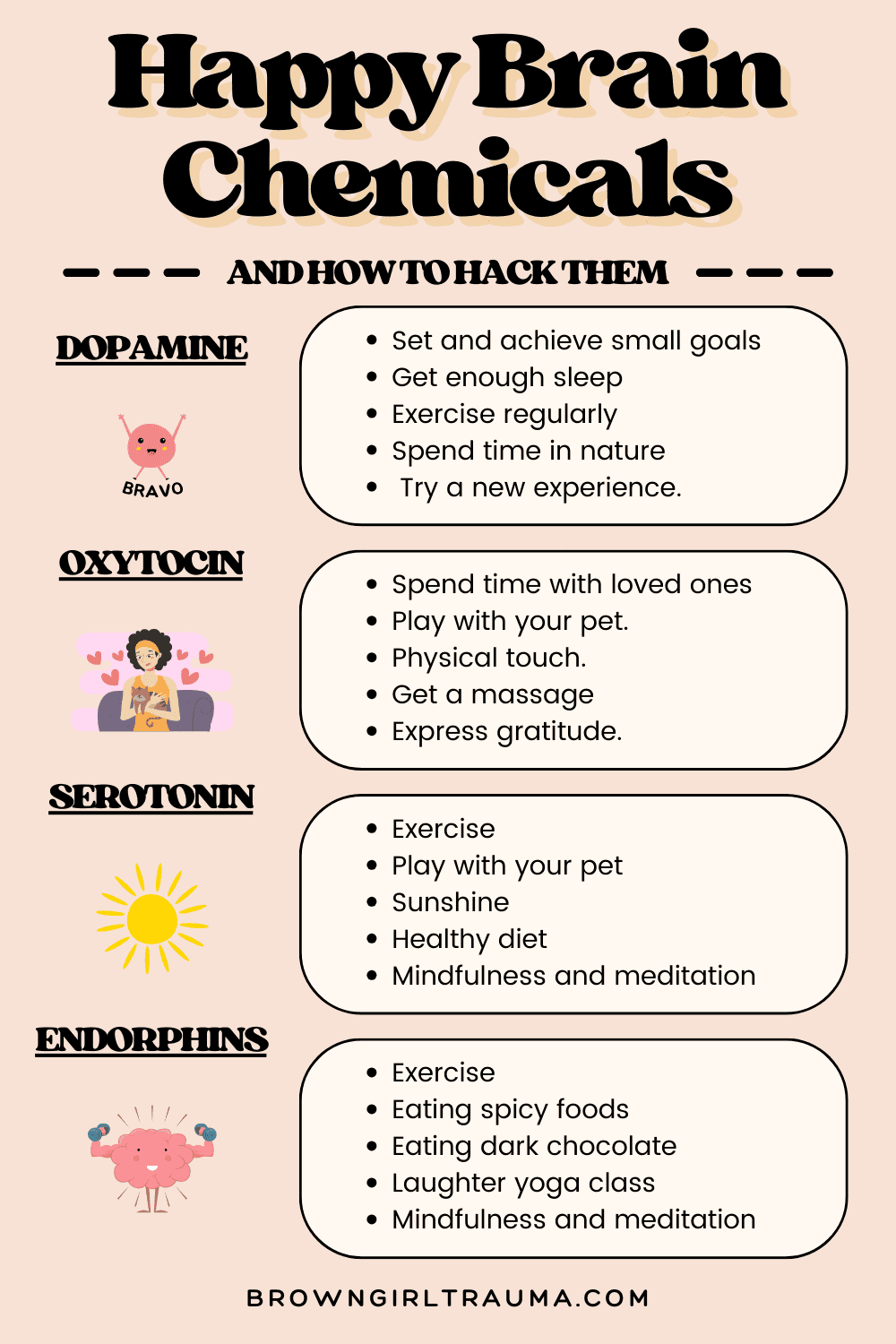The 4 Happy Brain Chemicals You Need To Know About
Have you ever stopped to think about how understanding our happy brain chemicals can help those of us working hard to break cycles and create a happier life? The key is in your brain's chemistry. Your happy brain chemicals have a big say in your emotions and mood. But what are these happy brain chemicals, and how do they affect your happiness? Well, you're about to find out, so keep reading.
Feeling happy is something we all strive for, but did you know that some specific chemicals in our brain, often called happy brain chemicals, are responsible for regulating our mood? Understanding and learning how these hormones work and which activities can help you boost your mood can help you feel happier overall.
As you keep reading, you will be amazed at just how simple it is to hack your happiness chemicals and make a real difference in how you feel. We will explore four main happy brain chemicals: dopamine, Oxytocin, Serotonin, and Endorphins. Don't worry; I will break down what each one does, how it impacts your emotions, and simple ways you can increase their levels naturally.
Let's get started with helping you understand how your brain helps you feel happy.
What are Neurotransmitters and How Do They Affect Your Mood?
Neurotransmitters are chemical messengers in your brain. They help different parts of your nervous system communicate with each other. Think of them as tiny mail carriers that deliver important messages from one nerve cell to another. These messages can influence everything from your mood to sleep, your heartbeat, and your ability to learn.
Your neurotransmitters have a direct impact on your mood because they control how your brain communicates and processes emotions. When your neurotransmitters are balanced, they help maintain a positive outlook and stable mood. However, imbalances can lead to mood swings, anxiety, depression, and other emotional challenges. The good news is that understanding how these neurotransmitters work can help you take control of your emotional well-being and foster a healthier and happier mindset.
The 4 Happy Brain Chemicals You Need To Know About
Understanding what makes YOU happy can be a powerful tool. Our brains have specific chemicals that play an important role in regulating our moods and emotions. These happy brain chemicals include dopamine, oxytocin, serotonin, and endorphins. Each of these chemicals contributes to your well-being in its own unique ways. Let's dive deeper into how these four happy brain chemicals work and how you can hack them for your mood and happiness.
1) Dopamine (The Reward Chemical): The reward chemical that drives motivation and pleasure.
2) Oxytocin (The Love Hormone): The love hormone that fosters connection and trust.
3) Serotonin (The Feel-Good Chemical): The feel-good chemical that stabilizes mood and happiness.
4) Endorphins (The Pain Reliever): These are natural painkillers that are released during stress or discomfort through rewarding activities.
Are you wondering how to increase happy hormones in the body? Well, keep reading.
Pin these 4 happy brain chemicals for later!
How can you effectively boost your happy brain chemicals?
Hacking your happy brain chemicals is simpler than you might imagine! By starting with small daily habits, you can significantly impact the balance of these chemicals. Hacking your happy brain chemicals involves finding natural ways to boost these chemicals that make you feel good. Once you understand how they work, you can enhance your overall sense of happiness.
If you are wondering how to increase happy chemicals in the brain, don't worry. I will later discuss more detailed ways to hack each of the happy chemicals in the blog. For now, keep in mind that when you engage in activities that bring you joy, you set in motion a positive feedback loop. This loop is a key element in effectively hacking your happy brain chemicals.
Let's look closer at each all happy brain chemicals and how to boost them!
1) Dopamine: The Reward or Pleasure Chemical
Dopamine is the key player linked to reward, motivation, and pleasure. When you initiate an activity, dopamine gives you a little push to get started. If you find that activity or task at hand useful, more dopamine is released, which encourages you to keep going.
When you finish a task or complete a goal, your brain releases dopamine, giving you a sense of accomplishment and encouraging you to repeat the behavior. This process of dopamine release when a particular behavior feels good is what reinforces the behavior, creating a positive association and the desire to repeat that action to bring pleasure or rewards.
Dopamine is released in different amounts depending on the activity, and as the saying goes, too much of anything is bad; dopamine is best in moderation. Low dopamine activity can lead to fatigue, mood swings, muscle cramps, brain fog, lack of energy, etc, and high levels of dopamine in the brain can cause anxiety, increased feelings of stress, hallucinations, etc.
Some activities can provide quick and intense pleasure, leading to large surges of dopamine release and creating a powerful sense of reward. It motivates you to seek out and repeat the same behaviors you want or crave to reach the same level of satisfaction. Some high dopamine booster activities include eating sugary food, using substances, alcohol, social media, video games, etc, where your brain quickly learns to associate them with intense pleasures. Your brain automatically regulates dopamine release based on what it identifies as rewarding, again motivating you to seek out and repeat similar behaviors.
For someone raised in a household with addiction, for example, understanding the cycle of dopamine can be extremely helpful. You might have seen how certain substances can create addictive cycles in the pursuit of that dopamine high despite negative consequences. As a cycle breaker, you can use your understanding of dopamine cycles to be aware of dopamine's influence and avoid falling into the same patterns. When you understand the pleasure-reward system, it allows you to create new and healthy cycles that are balanced.
Happy Brain Chemical Hacks for Dopamine
Here are some simple and easy ways to hack your happy brain chemicals:
- Set and achieve small goals: When you set and achieve a smaller goal that is realistic and attainable, it gives you a sense of accomplishment, which releases dopamine.
- Get Enough Sleep: To help regulate dopamine production, try to get 7-9 hours of sleep.
- Exercise Regularly: Activities like cycling, weight lifting, or running can release dopamine, which helps boost your mood and motivation.
- Spend Time in Nature: Surround yourself with nature. Did you know that just 20 minutes of nature therapy can help lower your stress hormone levels? Get outside and take advantage of this low-cost solution to help boost your dopamine levels.
- Try a New Experience: I recently learned how to repot my plants, and let me tell you, it was the most amazing experience. I was so present and felt really accomplished at the end of it. If you aren't into plants, try exploring a new activity, place, or skill that can help stimulate your dopamine production.
2) Oxytocin: The Love Hormone
Do you ever crave a hug from a loved one or feel an overwhelming sense of love, belonging, and safety? These feelings are thanks to your feel-good hormones, which help you bond with others.
Oxytocin, often called the 'love hormone,' is a natural hormone made in our brains. It plays a key role in connection, social interactions, bonding, and empathy. When you hug someone you love, play with your pet, have deep conversations, or even breastfeed, your brain releases Oxytocin. This release helps create feelings of trust and emotional connections, which makes it easier for people to form and maintain relationships.
When Oxytocin is released, it causes actions that can lead to even more Oxytocin being produced. For example, when you play with your dog, your brain releases Oxytocin, which makes you feel good and encourages you to keep playing with your dog, leading to more Oxytocin being released. HOW AMAZING!!
People with higher levels of oxytocin are generally more relaxed and happier, but lower levels are linked with mental health conditions like anxiety, depression and Autism. Fortunately, there are many simple ways to boost your Oxytocin naturally.
For those raised in a dysfunctional family, understanding the role of oxytocin can be helpful as you navigate building trust and close connections with others. Growing up in an unpredictable and unstable environment can affect how your brain produces and responds to oxytocin, making it harder for you to feel connected and secure with others. Now that you have a better understanding of this happy brain chemical, you can allow yourself to seek out experiences that can help boost your oxytocin levels.
Happy Brain Chemical Hacks for Oxytocin
- Listen to music: Open Spotify, find your favorite song, and sing away with your friends or family.
- Play with your pet: I mean, if you are a dog lover like I am, you probably do this every day anyway, but spending time with your pet, such as going for a walk, playing, or even just sitting close to them, can help boost your oxytocin levels.
- Physical Touch: Whether you get a massage, hug a loved one, or hold hands with someone, physical touch can significantly increase your oxytocin levels.
- Quality Time: Host a game night, play 21 questions with your friends, or have meaningful conversations with friends and family.
- Express Gratitude: When was the last time you thanked someone for choosing between being part of your life? Or expressed appreciation? Express your gratitude to help foster your connections.
3) Serotonin: The Mood Stabilizer
Serotonin, a natural mood stabilizer, is a key player in maintaining a balanced and positive mood. However, its influence extends far beyond just your emotional state. It also regulates your sleep, digestion, motor skills, and healing. When your serotonin levels are in harmony, you experience improved sleep, efficient digestion, and better motor skills, in addition to a happier, less stressed mood.
Low levels of serotonin are often associated with depression, anxiety, and sleep disturbances. Conversely, an excess of serotonin can lead to heightened feelings of anxiety or excitement. In severe cases, an excess of serotonin can lead to a condition known as serotonin syndrome, which is characterized by symptoms such as confusion, high blood pressure, agitation, and a rapid heart rate, which usually happens when there is an excessive amount of serotonin due to taking too much medication or combining medications that increase serotonin levels.
For those who have grown up in a dysfunctional family, the struggle to maintain balanced serotonin levels can be more pronounced. The constant emotional turmoil and stress experienced in such an environment can disrupt the natural production of serotonin. This imbalance can lead to increased feelings of anxiety, depression, and stress, making it harder to cope with everyday challenges. When you experience chronic stress, it can alter the brain chemicals that help regulate your mood and cognition, including serotonin.
When you understand how your upbringing impacts your emotions and stress levels, it becomes clear that finding a way to feel more balanced is essential. This understanding can lead you to explore the impact of serotonin and ultimately find strategies to manage your emotional well-being more effectively.
RELATED POST: 100 Simple Things That Make Me Happy
Happy Brain Chemical Hacks for Serotonin
- Exercise: Work towards the serotonin high. Whether you walk, run, go for a swim class, all you need is 30 minutes to improve your mood. When you exercise, you increase tryptophan, an amino acid used to make serotonin in the brain.
- Play with your pet: I mean, if you are a dog lover like I am, you probably do this every day anyway, but spending time with your pet, such as going for a walk, playing, or even just sitting close to them, can help boost your oxytocin levels.
- Good sleep hygiene: Poor sleep negatively impacts your serotonin levels, so you want to practice good sleep hygiene by having regular sleep schedules and creating a calming bedtime routine. Try to aim for 7-9 hours of restful sleep.
- Healthy Diet: Consuming foods rich in tryptophan that helps produce serotonin. Foods include salmon, nuts, tofu, and seeds.
- Mindfulness and Meditation: Practicing mindfulness on a regular basis can help reduce stress and increase your serotonin levels by promoting relaxation.
- Sunshine
4) Endorphins: The Pain Reliever or Nature's Morphine
Endorphins, also known as the happy hormones, are your body's natural painkillers. They are released during various activities, such as exercise, consumption of certain foods, exposure to sunlight, and even laughter. These natural ways can be incorporated into your daily routine to stimulate endorphin release and improve your mood.
When endorphins are released, they interact with the receptors in your brain, significantly reducing your perception of pain. This natural process not only helps to improve your overall mood but also acts as a powerful buffer against stress and discomfort, offering a sense of relief.
Growing up in a dysfunctional family can often mean dealing with high levels of stress and emotional pain. Understanding how your body works to protect and heal you can help show that your body has an innate mechanism in place to help you feel better.
Happy Brain Chemical Hacks for Endorphins
- Exercise: How to increase endorphins naturally? Exercise. Exercise is a great way to boost your mood. Engaging in activities like high-intensity interval training, running, and vigorous sports triggers endorphin release to help cope with physical stress and pain.
- Eating spicy foods: If you know me, you know I LOVE spicy food. When you consume certain types of spicy foods like chili peppers, the active components in peppers can trigger a pain response in your mouth, which leads to an endorphin release as your body tries to counteract the pain. If you do not love spicy foods or have specific dietary restrictions, feel free to pass on this one.
- Eating Dark Chocolate: Don't worry, if you aren't a spice lover, you have the option of indulging in a small amount of dark chocolate. Dark chocolate contains compounds that can stimulate endorphin production contributing to a natural boost in your mood. P.s my favorite dark chocolate is peanut butter cups from Trader Joes.
- Laughter Yoga Class: When you laugh uncontrollably, you combine it with yogic breathing techniques that can help increase endorphin levels through the physical act of laughing and the social connection it provides.
- Mindfulness and Meditation: Practicing meditation is another way to trigger endorphin release.
Conclusion
Well, there you have it! The four brain chemicals- dopamine, oxytocin, serotonin, and endorphins. These natural mood boosters are all within reach with simple actions like setting a small goal, spending time in nature, or getting restful sleep. It's all about taking small steps towards your well-being every day.
I continue to work on these things every day, and some days it comes easier than others. However, I hope you leave with the reminder that healing and happiness are part of the journey, not the destination. Whatever step you take today will bring you closer to a healthier and happier YOU. You deserve to feel good, and these happy brain chemicals are a step towards breaking unhealthy patterns and building a brighter future.
Psst...pin this post below to boost your brain's happiness daily!
Love this? You'll enjoy these too!
100+ Simple Affirmations for Anxiety for Those Raised in Dysfunctional Families
15 Coping Skills for Anxiety You Need To Know Now
10 Practical Mental Health Goals For 2024 For Your Self-Growth

Nisha Patel
My name is Nisha Patel. I am a Licensed Clinical Social Worker and the face behind the space Brown Girl Trauma (BGT). BGT is a Mental Health and Self-Growth Community for Adult Children of Dysfunctional Families. The central question that drives my work is, “How can we break the cycle of family dysfunction?” To answer that question, I like to write about ways to reparent your inner child through healthy self-growth & mental health practices- addressing your unmet needs.





